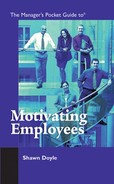What Gets Your People Excited?
Some managers don’t understand that everyone’s motivations are different. It’s the equivalent of buying one key and expecting it to unlock any lock. The idea of course is that each lock is different and takes a different key. The same is true with people: The motivating approach must be different for each person. When managers meet with employees to discuss their goals and growth, they should ask many questions to try to uncover their real needs. It is only by meeting these needs that a motivating environment can be created. Here are some questions that managers should ask employees in order to uncover their needs:
• What are your career goals for the future? In one year? In five years?
• What kind of work really “spins your wheels”?
• What kind of work do you love doing?
• What kind of work do you dislike?
• How can I help you?
• As your manager, what would you prefer in the relationship between us?
• What is important to you? Why?
• What do you consider a reward?
• What do you want?
• What was your favorite job? Why?
These questions help uncover the needs of the employee and what motivates them. It is important for the manager not to steer the answers. Listening and taking notes is a great way to approach the meeting. Managers should make the meeting about the employee.
Finding out what motivates employees can also be learned through observation. Managers can observe how employees respond to various assignments and projects. Over time, the manager can learn what they like and dislike. It is obviously not always possible for managers to give someone work that they enjoy; however, whenever possible, managers should try to assign work that an employee is excited about accomplishing. The result is tremendous—an employee who is excited about their work.
One time when I was in a drugstore, I was chatting with the cashier as I went through the line. I asked her how she was doing. She frowned and said, “Okay.” I responded, “Not great, not fantastic?” She looked up and said, “Hey mister, I work in a drugstore.” I would argue that the manager is at fault in this case. If the manager had sat down and found out what that cashier wanted, then maybe the cashier would be more motivated because she knew where she was headed. Maybe that cashier wants to be a manager and has never talked to her manager because she has never had time. The manager probably assumes that being a cashier is all she wants. It is the obligation of the manager to develop all employees to their full potential.
